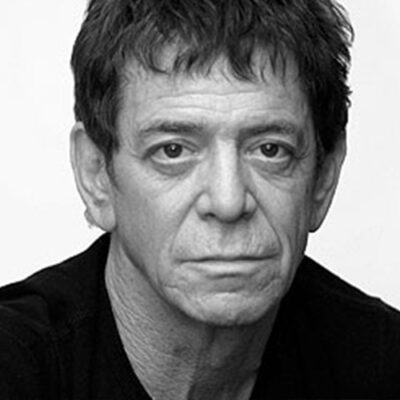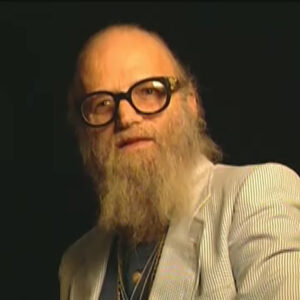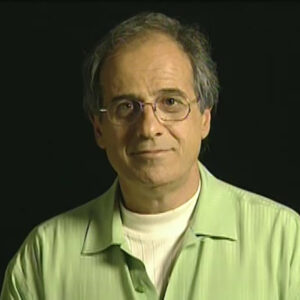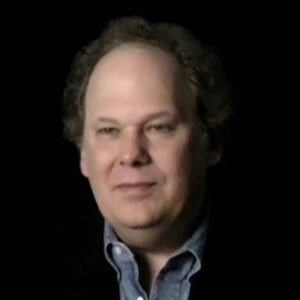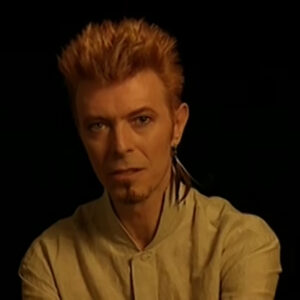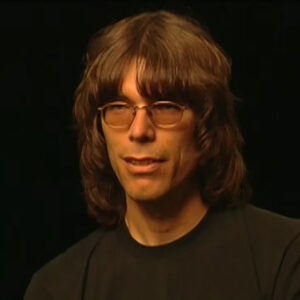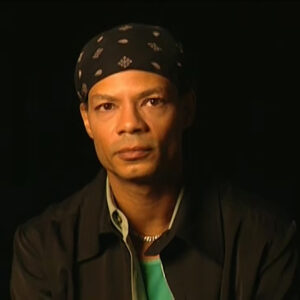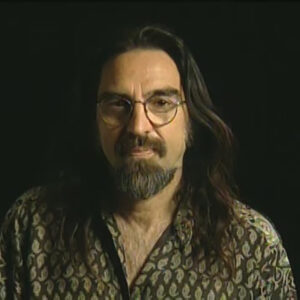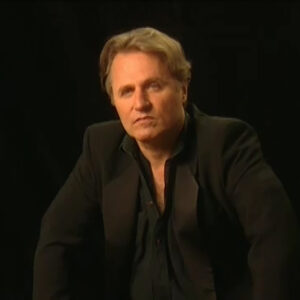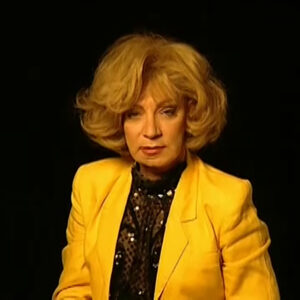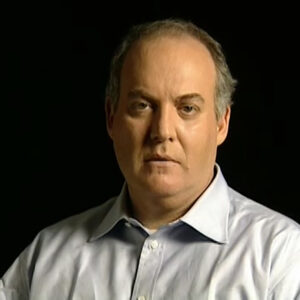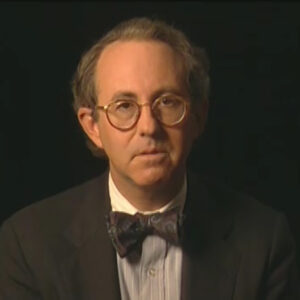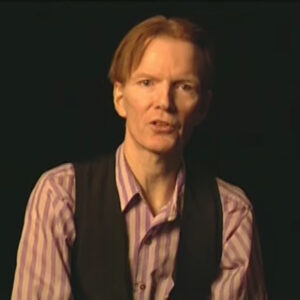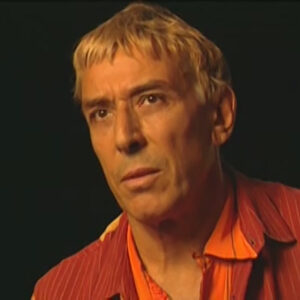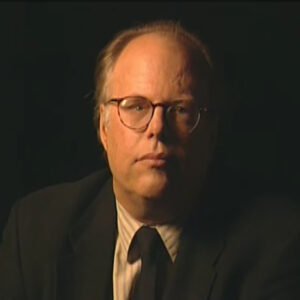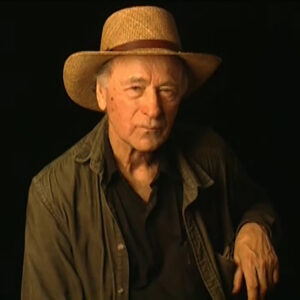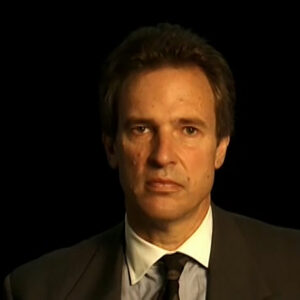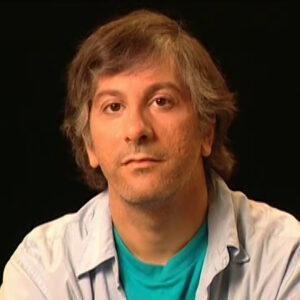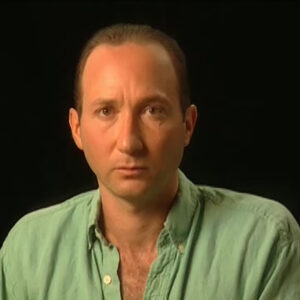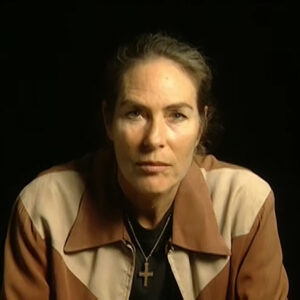Speaker When I was 15. That was probably like sixty four and a half or something, 1960, four and a half, and after school about two or three times a week, I’d go up to the factory and just hang out and watch Andy paint because it was I just love the atmosphere. There was opera and drugs and painting and pretty girls. So all my favorite thing. So I would go after school and then I started living with an older man on the weekends as a friend. And his name was Stanley. And he had this great, incredible apartment that was still the best apartment I’ve ever seen in my life. He was an antique dealer. He had like hundreds of Tiffany lamps he had and everything had a price tag on it because everything was for sale and the refrigerator was filled with acid. And again, acid was legal. So there was no problem with it. It wasn’t even illegal yet. So the only thing in the refrigerator was like two oranges and about 750 doses of acid. And Tiffany lamps and price tags on everything and Moka prints. And it was amazing. There was a there was a wall with 61000 postage stamps cut out to the head of George Washington with nail clippers. Because of the cancellation marks, each face was different. So it was like amazing. You would trip and, you know, it would just be like, totally insane. So that’s the way we lived. And into that atmosphere came Lou Reed and John Cale, and they came to stay with us. And the front apartment, Stanley, at the whole floor, the front apartment was Tom O’Hara again, who did hair, and he was a collector of exotic instruments. So the whole apartment was giant mirrors, an incredible exotic instruments that we could play at any time of night or day. And Lou and John came to stay there and I was in the back apartment, which was connected by the spider room. And this was a a mural painted broom with a giant spider lamp that his legs spread out. So that’s pretty much the atmosphere in which we met me and lo. And we hit it off instantly. I mean, we were like, just add water. And we were friends. It was like instant relationship. And, you know, I was saying to somebody. I’m your only yesterday that, you know, at the time, like the 60s, have a reputation of being, you know, totally cool and blown out. And the fact was there was 35 cool people in New York at the time, tops. And cool meant in those days that you were ready for the new era. You almost ninety eight percent of the time took drugs and. And you would you were interested in something out of the ordinary. Usually in the arts or whatever. That was sort of the definition of cool. I mean, there was the old beat next, but they were already getting sort of stale. And then you had like 35 people. The rest of the people were like 50s Republican right wing McCarthy nut jobs. And so you didn’t have much of a choice of friends. And so when you recognize somebody with those attributes, you latched on to them because it was lonely. It was really, really lonely in New York. There was the Lower East Side. We’re still immigrants. Basically, the West Side was industrial and it was just the gay cruising area for leather boys. And the scene was only two nightclubs. And Dean and Arthur. And that was it. And then you had maybe thirty five people who were cool. And then everybody else was bugging you for wearing your hair long or, you know, trying to say you were a communist or trying to you know, it wasn’t like it’s pictured in the documentaries of today. It was a lonely time.
Speaker So we became fast friends in the World factory. I was 35.
Speaker Well. Everybody at the factory was either doing photography, dance, art, film, music like Lou.
Speaker And we all found each other. I mean, there was a couple of people outside of the scene. Definitely. But they soon came in because, again, it was lonely out there. It was cold and lonely. So we all sort of hovered together. And, you know, one thing that all the movies about New York leave out is the infantrymen, Fetterman Nest, which was probably the most important. Thing of the time, I mean, it is the way an amphetamine nest was somebodies apartment when you went in for seven to nine days and didn’t leave because almost everybody stayed up seven days in a row. And if you really pushed it, it was nine days in a row. So you’ve got to know each other pretty well. I mean, I used to draw and paint 22 hours a day, go out dancing for to come home, do the same thing the next day. And while you’re drawing and painting and even handed this, you would talk and you would talk about what’s you know, what you’re thinking, what’s going on. Crack jokes. And you you know, you you bond instantly. It’s sort of like a film crew that goes on a movie set. Only this was an Fetterman nest and you just stayed there. And there was usually like thousands of beads all over the floor. And every time you walked across the carpet, the room changed. So you can never walk across the room without the whole room changing. All the colors would change. And you were. Basically, just out of your mind and saying, which I don’t think is cool today. I mean, like the cool people today don’t take drugs, but in those days they did. So it was a whole different time period where we can now where we are is 65 and a half to sixty six and a half, maybe even into 67. And Lou, Lou has already made the banana album with John and Moe and Sterling. And we were playing I jumped by the way. I join them for a year from now, 66 to 67. I toured with them on the East Coast. I couldn’t go to the West Coast because I wasn’t allowed out that late. I mean, I was like in high school. So I had I, I could I couldn’t miss school. So I would go to Boston, Provincetown. You know, the eastern gigs. And every Friday and Saturday we’d play the Domme, which was the old Polish, the old Polish meeting hall on St. Mark’s Place that later Bob Dylan helped name the name the Balloon Farm. So this was like it. I mean, this and the Lower East Side, you had the Fillmore East and you had the DARM and the Fillmore East. With sometimes great, but sometimes really corny. And the DOM was always great. It was always where, you know, the prettiest girls when the craziest guys and the cutest guys. And it’s where the Velvets played. And then they were joined sometimes by other bands like Frank Zappa and the Mothers of Invention. We played with them there. And I was a dancer with Gerard Malanga and Mary Warner. And so we were out front. The Velvets were in back of us. And with their backs turned to the audience, which I was telling you before in those days, was really odd because groups would come and go, hey, come on, we got all love each other and get together. And, you know, we were not flower children and we were in ferrymen nest scumbags, really. And we just sort of turned our backs, except for the dancers who assaulted the audiences with bullwhips flashlights. We had to wrap our bodies and tape lighting. And how I got the thing was I was a really good dancer. I always wanted to be an artist. I had I never entered. I rock and roll doesn’t do it for me. It’s just too many road tours and lonely motel rooms. But I like the groupies and I love the music and I like to dance. So it was a natural for me. So I did it for a year and I left in 67 because pretty much everybody had learned to dance. By 1967, nobody even knew how to dance like they used to stand there in the audience like this and just sort of move. And we would dance by 67. They learned how to dance. And Mary and I looked at each other at. We were playing the scene. Steve palls the scene, and the kids just came up on stage with us and started dancing. And we looked at each other and said, it’s pretty much over. And and the dancers left the exploding plastic inevitable. And it went back to being the Velvet Underground. Now, meanwhile, all during this time, Lou and I are still really close. I mean, Lou’s like my older brother. That’s how he keeps like six years older than I am. So he’s like my older brother.
Speaker And, you know, it’s been that way ever since. You know, it’s now 1997. And, you know, we’re having dinner this week. You know, George Burns and.
Speaker And let’s talk about the factory relationship.
Speaker Contribution.
Speaker Well, the relation. All the relationships of that time period were based on paranoia. You. There was well, because of the amphetamine and because of the time period, because because of the corniness of the 50s. And because of the investment, nobody ever expressed a feeling if you expressed the feeling you were out. That was it. So it was based on holding and all your emotions, talking about the next thing to do. And pretty much transferring your feelings onto the other person. If you were feeling shaky or paranoid, you would make the other person feel shakya paranoid. That was the deal. And Andy Illouz, while Andy was a mentor. Our work, work, work. Bring home the bacon low. Make the top 10, you know, records, Bubba. Bring home the bacon. You’re wonderful. And in other words, we were also very supportive of each other. That was the odd thing in the middle of paranoia and expressing no feelings at all. There was a support. There was a wonderful support, Andy. I was all for Lou Lewis, all for me. And he was all for low. Lou is all for Randy. There wasn’t there wasn’t much jealousy, is what I’m trying to say. Well, there was no feelings. So you couldn’t have jealous. You know, you were jealous. You were real. So it just wouldn’t work. So there was no there was a really great sense of support at the same time, which is one of those Andy paradoxes, you know, that everybody talks about for decades. But it was really just to shut down your emotions and think about the now and the future. And, you know, the past didn’t exist.
Speaker We fight for a second any context what year this is?
Speaker OK. OK, so let’s go.
Speaker Maybe a little bit further. Tell me about you work for that for 10 years and was in and out of the factory during that period.
Speaker Okay. I worked with Andy as his art assistant from 1972 to 82 during that period on and off.
Speaker And Lou would come and visit us and.
Speaker Andy and I were really thrilled for Lou’s success. He had already done Walk on the Wild Side and he had broken, you know, into the charts. Whereas the Velvet Underground never did. They couldn’t even get radio airplay. The songs were so volatile and charged with urban misfits and drugs and, you know, some violence like as in Sister Ray. So we were thrilled for Lou and Lou would come and visit us. And, you know, Lewis, now, a star like my older brother was a star. Andy loved stars. Lou loved Dandy. And we all just like we’re really. Very close, but in a distant way, because we were all off doing something, I. I was working very hard to produce some of Andy’s paintings of that period. Andy always worked hard because he was a workaholic. And Lou is making hit hit records. So our relationship was more distant but close when we were together. And, you know, I would go off. I mean, I went out every night so I would go out with Lou and whoever was, like, around in those days. And we, you know, we would go, Dad. But I don’t know. Lutin doesn’t dance much, but we would go out and I would dance and Lou would, you know, do whatever Lou needed to do. And he used to visit maybe once a month, come up. And then we didn’t see him for a while. And that that’s another thing about the Lou relationship. It it it drifts in and out depending upon who were living with, you know, as lovers or who where, you know. You know, we’ve made new friends or what, you know, whatever the circumstances or what project we’re working on, so it was pretty drift and drift out, but always close songs for Drella, which, of course, it’s all about Andy.
Speaker As someone who knows Andy any so well, how do you think captured Andy there? Tell me about your thoughts about that.
Speaker It’s it it’s it’s a wonderful album, and I think because it shows us say what the songs are, songs for Drella. I think it’s a wonderful album because it shows on all the different facets of Vandi. I mean, Andy was very misunderstood. Hardly anybody knew Andy. I mean, the only way you got to know Andy was to either live with him or work with him. There was really no other way because Andy was a workaholic. So that’s where you formed your close bond. And Lou had done both. I mean, we even live with him. But I mean, again, in the in Fetterman Nest kind of environment, it’s almost like living. So. This songs for Drella was a very accurate portrait. But again, it was from. It was from Lou’s and he was such a mirror that reflected that people always in some way wound up talking about themselves when they were talking about Andy, which was like the magic of it. So songs for Drella, I think it’s really about Lou and John and their perceptions of somebody who they were really close to, like Andy, which makes it a very personal portrait.
Speaker Lose sight of your marriage, maybe a little. And he was sort of a mirror. You talked about that some context. Did you see?
Speaker Well. I’ll be a mirror. It is it’s one of my favorite velvet songs. But in my opinion, what it’s about is trying to rescue. It’s about a co-dependent relationship where you’re trying to rescue a damaged woman from herself so that she could, in turn, love you. But it will never happen. And that’s why I think the song is sad. And, you know, that still goes on today. That’s that that’s not you know, that’s not trapped in any decade. So I think it transcends almost any time period. I mean, unless the culture gets so healthy that co-dependency is no more. But I seriously doubt that.
Speaker But it’s a brilliantly sick, co-dependent love song about trying to rescue a damaged woman in this case. To me.
Speaker That’s absolutely wonderful. Karen, anything I’m forgetting? Hey, I thought you talked about your four best friends. I love that. So is there any way to talk about. That’s what I’m hearing.
Speaker Yeah. OK. Yeah, we could we could bring that up. And the Karen was talking you were talking about like the current stuff, like magic and loss.
Speaker Oh, yeah. No, I know how you could bring in the the other the other three is like, you know, just backtracking a second about, about the close bonds of that time because or the reason why Lou and I are still friends to talk about.
Speaker I mean, the reason why Lou and I are really still friends is because the other three are dead. So if they were still alive, I’d have four oldest friends, but I don’t. I only have one. So that makes our relationship, like, more special.
Speaker Start that over again and save the friends.
Speaker OK, but you have to ask a question.
Speaker You have a great close friendship with Lou. Are there other people that you are friends with? What is it about that relationship, friends?
Speaker Well, one of the things about my relationship with Lou is that at the time at the time, I had four best friends. One of them was Erica Emerson. One of them was Jim Morrison. One of them was Jimi Hendrix. And the other was Lou. Now the other three are all dead. Eric. Jim and Jimi are dead. And. For me, anyway, what makes Lou so special is that he’s still alive. And sometimes we go out to dinner and look at each other and go. You survived. And it’s really funny and better at the same time, but funny. And, you know, that just brings us closer together.
Speaker What kind of relevance did magic and laws have fun those life and then use the word matching laws that we know what we’re talking?
Speaker I don’t know the relevance of magic and loss. The song on Lou’s life necessarily, but in my opinion, I think it’s one of the most brilliant songs ever written. Period. You know, along with Cole Porter and whoever Irving Berlin and whoever else you want to throw in there. I mean, that song is for me, just says just about everything about.
Speaker The trials of life. You know, the hope and the loss.
Speaker And I hadn’t seen live for a while and when I heard the song, I played it seven times and I cried seven times. And then I bumped into him and I said, you know, I said, Lou, how did you write that song? I mean, how did you write that song? And he was very sort of flippant about it. And he just said, you liked it. I’m really glad that you liked it, Ronnie. I’m really glad and didn’t answer much about what was going on with him at the time. But I mean, the song speaks for itself. It’s sort of trial by fire, starting from zero again. And and I was actually to learn that a few more times after that song was written, because I’ve had to start from zero again since that song. And I’m sure everybody does.
Speaker And another song would be Dime Store Mystery. I adore that song. It has that old velvet flavor. It’s it manages to weave the life of of Warhol and the death of Warhol and with other are you with other things in it that are current and you know. I think that’s a gift that Lou has. This is to weave as in Halloween parade with the old friends, Rotten Reid. Nobody knows who these people are. And it doesn’t matter because they’re old, lost faces and a parade. And, you know, I’m trying to think of, you know, have sex with your parents. Great song. You know, lashes out at all the backlash in the 90s of right wing incestuous Republicanism.
Speaker And, you know, there are 15 million insets a year in this country and people like Lou and I are not doing it. It’s usually the rigid, repressed, insane people who are trying to take away First Amendment rights. So, you know, I love that spirit of lo. I have that spirit, too. I mean I mean, I’ve done performances where I’ve attacked that issue directly. And that’s where we parallel, at least in thinking. And then the rest is emotional. It’s old buddies.
Speaker What are the things that I think is interesting about that? Because you write in, the first person feels like that you you read into these songs.
Speaker This is really about. Often it’s not necessarily about Louise just able to for example, she was right about cancer in a way that you feel you talk about how. You see him and me as a sort of songwriter who is able to.
Speaker Bring you close to some subject? Well.
Speaker As in the song Magic and Loss and those points you just mentioned about making it both universal and personal. That’s why lose a poet. That’s the difference between a pop tune writer and a poet. I mean, there’s there’s. That’s it. There’s no other way to describe it. That’s what makes it poetic. If you can make X amount of people feel by talking about yourself, then you’ve tapped into the collective consciousness. As a poet would.
Speaker Any further down? Why didn’t produce the record? You weren’t there anyway.
Speaker Andy didn’t find the Velvets. That’s mythology. It was Paul Morrissey and Gerard Malanga had something to do with it. They were playing at the bitter end, which was just down the street from Stanley. The man who we all wound up living with. And, you know, they were they were small West Village, almost folk band in a funny way. And but they had that edge. They had that that that Velvet Velvet Underground is from a dime store novel about the SEC, the underground sex scene in any culture, in any city at any time. And. That was instantly recognizable in those guys. I mean, Mo looked like a boy, but she was and and you never could really tell. And, you know, Lou is like cute and tight and handsome and, you know, thick necked and can wrap around sunglasses. John with his, you know, a while later he got the diamond collar, but that the whole look was something that could be put on film. And on records, you know, well, by the time Andy eventually came down. It was time to do that. I mean, Andy basically invented the light show. There was no light shows before that, really. And. The combination of film backdrops is cut out Stansel cardboard things with bubble solution made at the theater or the spectacle of it. And that theater was later to be copied by people like Boet Aguy Alice Cooper. It was it was really a theatrical event. By the time Warhol got finished with it.
Speaker Can you do exactly what you’re saying and talk about what it was like at that time? In other words, you’d go to the Fillmore and see the dead?
Speaker I guess whoever was playing that was just like the stage and.
Speaker Why was this?
Speaker Well, the songs were about the dark city lighting particular.
Speaker As I said earlier about the exploding plastic inevitable show, the lighting and the and the front people, including myself, assaulted you. The group played the best music. Hardest edge music that probably could be heard on the planet at the time. That combination was never done before at the Fillmore East. You know, basically, you’d have potheads coming out with longish hair. Some of them very talented. You’d have heroin addicts, Janis Joplin, a Gault’s, a very talented, but it was a whole different world. You go you go to the DARM, you have people who have not slept for seven to nine days who are pasty faced. They wouldn’t know a tan if they tripped over it. That dressing like like sex fiends, like sex addicts, which in fact some of us were. And you could only see that at the dam at the time. And it was it it said what the Velvets were doing, apart from everything else in the music industry, which is why they didn’t get any radio airplay.
Speaker I know you’re from there with lots of other advanced you talk about what you think are influences. Particularly the other as well.
Speaker I’ve got the list is long, and I’ll probably leave some out. But I mean, obviously there’s Jim Morrison. He heard Lew on the West Coast. Everybody hated the Velvets on the West Coast. Jim Morrison. You know, saw saw the. The. The incredible poetry of it all. The the dark side of it and all the. Although he was an original himself, was deeply influenced by the Velvets. There was incredible group in London that nobody has ever heard of called. How Pash and the Colored Code featuring the human host and the heavy metal kids. They made one or two albums. Incredible, incredible band. They were they were influenced by the Velvet Underground. David Bowie. Iggy Pop. Alice Cooper. I’m sure to some extent. I mean, there is no way that you could be in New York and not either love or hate the Velvets. Jonathan Richman from Boston. You know, always instantly said that he was influenced by Lowe The Psychedelic Furs in 1881. Same story. Richard Butler is a good friend of mine. And we talked about Lou all the time. And sometimes we all go out together. And that’s interesting because, you know, you have the generations of that kind of of sensibility. Who am I leaving out? I mean, there’s so many. Oh, there’s the new group, Luna, that I mean, it just keeps going. It’s. And there are others. I mean, you know, there’s been bands that I can’t even remember that came out.
Speaker And again, it’s that dark.
Speaker Poetic, romantic, and yet cold and distant element in the music that that that attracts a lot of people, not all people. Some people still need that all, hey, we got to get out here and love each other. Some people love Wayne Newton. I mean, some people just need other things. But in the case with the Velvets, it’s strictly that that type of music that attracts. And again, in the late 70s, he was called the godfather of punk talking heads. A lot of the punk bands, the Sex Pistols. I mean, the list really adds up. I mean, Lou is one of the most important. Along with John.
Speaker Songwriters in modern history. I mean, there’s no doubt about that.
Speaker And that the whole punk era was so deeply influenced. That’s when Lou got popular. They made him the godfather of punk. Which is funny because.
Speaker When I was growing up in Lewis, growing up, punk meant like either like the stick that you had in your mouth that you burned, kept mosquitoes away, or like you were like a street urchin. So they glamorized it so much.
Speaker Well, starting with Transformer, first of all, that was produced by Bowie. So they were already both in to sort of semi punk, semi glitter rock scene. That was Bowie’s influence. And and Lou did it well. I mean, it was it was Lou’s mind and Bowie’s glitter influence. And he got new hair. He got new fingernails and, you know, played off the androgyny and the bisexuality and the whole nine yards. Then, you know, we go on to Berlin because they all escaped to Berlin, even though Lou had never been there. They all at least mentally escaped to Berlin and because New York was well, again. And now we’re talking the 70s where the most famous bands were Eagle Farner, Toto. I mean, how God I mean, that sort of gives the flavor of where we were. I was only listening to black music. I had totally given up on white music, except for Lou Reed and some Bowie and some Bryan Ferry. And I’d given up. I was totally bored. I only listened to Eddie Kendricks, Teddy Pendergrass, David Ruffin. So. So that that frames the whole middle of the decade. And then by the time Lou got to Berlin and one of my fave all time favorite albums, which is Street Hassel, he had gotten back to that that quality of life and death where you could die at any moment from a drug overdose or just having the wrong friends. And the makeup came off and he was back to Street Hassel, Waltzing Matilda, where you’re where you’re where you’re walking off a drug overdose, which we’ve all had to do many times with some of our other friends. So it was Firmat back to familiar territory. And I think by the end of the decade, 78, 79, 80 people had realized, oh, this is the real punk. This is The Godfather. Lou is, in fact, the creator of all this. And I think simply in a nutshell, he got the recognition that he deserved. Ten years later, one thing Lou told me when I was I’m six years younger, so I was really young when he told me this. He said, Ronnie, never be ahead of your time. And that’s that’s a hard thing to do. And it’s scary. I mean, you don’t really get it. You like you suffer a lot if you’re ahead of your time. So I. I can’t help but try and think ahead of my time to go into the next century. But at the same time, I know that’s not going to pay the bills. So that that’s always a hard thing for an artist who likes to think into the future or really wants to go into the dark caverns of the soul. And at the same time, pay the rent. And, you know, in my case, by art supplies and Lou’s case by new amplifiers and beautiful new guitars to play the music. So that’s always been the rub.
Speaker That’s the rub, because I think it was always there.
Speaker And he suffered greatly for it. Talk about that.
Speaker Well, again, he’s a little like my older brother. I mean, we sort of caught up because we both got the hair and, you know. But it’s he he knows what it’s like to pay your dues and tried to pass that on to me. Of course, it it won’t work because, I mean, now I’m doing computer generated canvases and people are gone. Are both paintings or those. Well, not with. And I’m still suffering. Lou is Lou suffered with magic and loss. I mean, we don’t take our own advice. Obviously.
Speaker I can’t think of. Well, right. Quick question. What is it about New York?
Speaker Right. I think what fascinates Lou about New York are the egg creams on the Lower East Side. The. Some of some of the danger about just walking down the street, the possibility of bumping into an old friend, a close friend or a new friend at any given moment.
Speaker I mean, you can literally go out for an egg cream bump into somebody you haven’t seen in 20 years. Go somewhere else, get caught up in that. And then eventually wind up back home if you’re not mugged.
Speaker And I think it’s the little things that New York I think. I really believe it’s that and nothing more magical and mystical.
Speaker Got to Saint-Marc bads and get brush down. You could do the things you like in a small area and bump into people and be constantly on the edge by people who might mug you or kill you or try to have sex with you.
Speaker There certainly was.
Speaker Yeah, I mean, there there was a few. There was a few songs whose when we when we were living together, he was riding in the front. But again, I was so out of my mind. The one thing that I witnessed firsthand was a metal machine music. I was out with Eric Emmerson. We got a phone call. Come right over. You have to come right over it now. What low? No, don’t ask questions. You must come over right now. So Eric and I look at each other and we go out. All right. Yeah, great. Let’s go. Cee Lo. So we go over to Cee Lo. And he’s perched behind a chair like this. And and the door is like open. And we walk in and he goes, listen, this is it. This is the white noise we’ve been trying to get. And he’s playing these tapes, you know, like an old tape. Whatever the hell they were then, I can’t even remember. I’m so homogenized with c.D. Anyway, there is metal machine music. And Eric and I look at each other and we love it, but we know that there will be one half of a record sold. So we don’t know. But we tell them we love it because we do. We understand it. We get it. We really love it. We’re having a hard time dancing to it, but we still love it. And we love low for even going to that place. That nasty place where he would torture you for 54 minutes or how ever long that little piece of vinyl was.
Speaker So that that that sticks in my mind, that particular.
Speaker Creation, say. Well, of course, yeah.
Speaker I didn’t really know Sugar Plum Fairy wasn’t close to old Sugar Plum. George was wonderful. You walk on the wild side.
Speaker I was wrong when he made that record. I liked it, but I didn’t love it. Like I loved Sister Ray or Venus in furs, and I was wrong. That turned out to be really an incredible, incredible song, which I adore today. But sometimes even when I hear new things, it’s like it it almost seemed like he’d gone commercial. But the references I loved, I mean, there was George Lucas Blue once commissioned me to do a mural forum. So I went over to his house and I stayed nine days. I decided not to do the mural, left it half finished and started collaging. And I left the entire apartment, totally collage with a nine inch trail from the door to the bedroom. Meanwhile, George Silver George is in the bedroom with the door shut. He has figured out that he can transmit electricity from a bare light bulb through his body, through a wire hanger to a plant, feed the plant electricity and keep it alive and make it dance. He will not open the door until he has accomplished this feat. At the end of nine days, we’re completely out of our mind. Undine It made me a shot. That was pure white milk and Fetterman. George opens the door and says, You are now welcome to come in. He is a big southern queen. We all walk in. He says, sit perfectly still. Do not move. He closes the window so that there is no air currents in the room. He sprawls out on the bed with his silver pants ame’s the wire coat hanger at the bare light bulb and points it next at the planned big big house plant which is perfectly still with no air currents where hardly breathing all the sun. The plant just starts dancing like this and I’ve never been able to explain it and nobody ever has. And he kept doing it for 15 to 20 minutes and then excused us and lose our apartment. So it’s, you know, those kind of people were in walk on the wild side.

